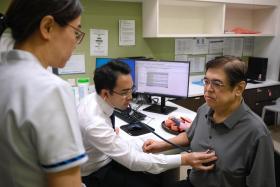Cochlear implant helps retiree regain hearing after years of struggle
She was initially worried about another ear surgery but feared social isolation more
Madam Audrey Heng had been suffering from deteriorating hearing loss in both ears since her late 20s.
She underwent a stapedotomy - removing the stapes bone in the ear and replacing it with an artificial device to enhance hearing in 1988 for her right ear and in 1992 for her left.
However, she lost complete hearing in her right ear in 1998and had to rely on hearing aids for her left ear from the year 2000.
But after experiencing a serious episode of vertigo while on vacation with her sister in the US in 2017, she lost hearing in her left ear as well.
So when Madam Heng, who is now 63, regained her hearing in 2018 after receiving a cochlear implant in her right ear, the experience felt "surreal".
The retiree told The New Paper: "When they turned on my cochlear implant, my first reaction was 'it is too loud', as I was used to not hearing anything in that ear for 20 years.
"But I was so happy I could finally hear. Hearing means hope for me."
A study in 2017 estimated that 422,000 older adults in Singapore suffer from hearing loss, and over 100,000 may have a disabling hearing impairment.
Ear, nose and throat specialist Barrie Tan from Barrie Tan ENT Head & Neck Surgery said he sees a "growing trend" of seniors developing severe hearing loss.
He said: "Hearing loss leads to a poor ability to communicate, so patients often withdraw socially since they find it difficult to listen to conversations.
"The pandemic serves to accentuate this social isolation as it has forced more people to stay at home."
DEMENTIA
He said dementia has been shown to be more prevalent among those with hearing loss, and this may stem from the reduced engagement with their social peers and the physical world.
On the experience of losing hearing in both ears for over a year, Madam Heng recalled: "It was another setback in my life, and I was really depressed.
"The thought of not being able to connect with the hearing world and being socially disengaged left me wondering how I was going to cope. Communicating with family and friends became a challenge, and I felt that I had imposed on and burdened them because they needed to repeat what they said. It was stressful for all of us."
While the option of getting a cochlear implant was brought up early upon her return to Singapore from the fateful holiday in the US, Madam Heng was initially hesitant as she was scared of another ear surgery. But her fear of being socially isolated and potentially getting dementia was stronger.
"I realised if I did not give it a try, it would never get better. Looking back, that was probably the best decision I made."
Dr Tan, who is Madam Heng's cochlear implant doctor, said she is the first patient in Singapore to receive hearing device implant brand Cochlear's Nucleus Profile Implant with Slim Modiolar Electrode, which is specially designed to be thin and cause little trauma to the inner ear.
Cochlear has also launched its new Kanso 2 Sound Processor, the world's smallest off-the-ear cochlear implant sound processor, which Madam Heng has tried on and is considering upgrading to.
Dr Tan said that while both cochlear implants and hearing aids can effectively help restore hearing, those who have severe or profound sensorineural hearing loss have to rely on cochlear implants.
He added: "Age-related degenerative hearing loss is natural with increasing age.
"However, living with hearing loss is entirely avoidable nowadays if spotted early and intervened with the appropriate hearing technologies."
Get The New Paper on your phone with the free TNP app. Download from the Apple App Store or Google Play Store now


